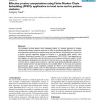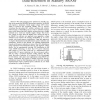83 search results - page 6 / 17 » Designing Reliable Algorithms in Unreliable Memories |
AGENTCL
2003
Springer
14 years 25 days ago
2003
Springer
We propose group communication for agent coordination within “active rooms” and other pervasive computing scenarios featuring strict real-time requirements, inherently unrelia...
ICPP
2000
IEEE
13 years 11 months ago
2000
IEEE
The idle computers on a local area, campus area, or even wide area network represent a significant computational resource--one that is, however, also unreliable, heterogeneous, an...
ALMOB
2006
13 years 7 months ago
2006
The technique of Finite Markov Chain Imbedding (FMCI) is a classical approach to complex combinatorial problems related to sequences. In order to get efficient algorithms, it is k...
ISCAS
2007
IEEE
14 years 1 months ago
2007
IEEE
Abstract— We study leakage-power reduction in standby random access memories (SRAMs) during data-retention. An SRAM cell requires a minimum critical supply voltage (DRV) above wh...
STOC
2004
ACM
14 years 8 months ago
2004
ACM
We investigate the design of algorithms resilient to memory faults, i.e., algorithms that, despite the corruption of some memory values during their execution, are able to produce...


